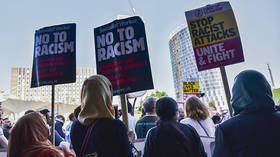‘Hate crime entrepreneurs’ are cashing in on taxpayers' money while they try to kill free speech in Britain

Free speech is under assault in the UK from organisations who inflate the number of supposed ‘hate crimes’ and ‘incidents’ to fill their coffers with government cash and leave us with only police-sanctioned expression.
Make a bad joke on Twitter, give a speech at a Conservative party conference, or refer to someone using the wrong pronouns, and you could find the police knocking on your door.
Last year, the police in England and Wales recorded over 100,000 hate crimes, up eight percent on the previous year.
Hate crime is defined as “any criminal offence which is perceived, by the victim or any other person, to be motivated by hostility or prejudice towards someone based on a personal characteristic.” This can include verbal abuse, intimidation, threats, harassment, or bullying, directed at individuals or groups on account of their race, religion, sexuality, disability or transgender identity. In addition to this – and the cause of much of the door-knocking – police also investigate and report ‘hate incidents.’ A hate incident is not a criminal offence at all, but simply any speech or action that someone from a ‘protected’ group finds offensive.
Also on rt.com British policing’s Orwellian practice of recording ‘non-crime hate incidents’ that blacklist children for thoughtcrime must endAs I investigate in ‘Policing Hate’, a new report published by the think tank Civitas, in England and Wales today we do not have free speech. We are only permitted to say things that do not offend others. And we do not have equality before the law; some groups of people are awarded additional legal protections to everyone else.
Now, the Law Commission, an independent body designed to review the law and make recommendations to the government, is proposing changes to hate crime legislation. Unfortunately, if enacted, these changes will go even further in curtailing free speech.
To understand why the Law Commission’s proposals are so censorious, we need to look to the influence of groups I’ve labelled ‘hate crime entrepreneurs’. These are charities and campaigning organisations, like Stonewall, Disability Rights UK, and StopHate UK, that support and advocate for people with disabilities, transgender people, and the lesbian, gay and bisexual community.
Many of these groups do a great job of representing their members’ interests. But when it comes to the law, this is a problem – they are neither neutral nor objective. In order to raise the money necessary to keep services functioning and pay staff wages, they need to present the people they support as disadvantaged and oppressed. Hate crime and hate incidents appear to provide one measure of just how victimised a particular group is.
But no matter how many statistics about hate incidents charities compile, we are no nearer to having an objective measure of the verbal abuse or hostility different groups experience. Offence is experienced subjectively. It is entirely possible for two people to hear the exact same joke, or listen to the exact same speech, and for one person to be offended while the other finds only humour or interest. One person might see themselves as a victim of a hate crime while their friend brushes off the same incident with a shrug of the shoulders.
Through their websites and campaigning, groups like Stonewall define hate crime and then encourage their members to see themselves as victims and to report crimes to the police. They then use these inflated statistics as part of their publicity material. Stonewall, for example, claims, “Two in five trans people have experienced a hate crime or incident because of their gender identity in the last 12 months.” This sounds shocking, but it may mean little more than they saw a transgender person being ‘misgendered’ on social media.
Also on rt.com The trans ideology of less than 1% of the UK population has bullied the other 99%. Here’s why I, as a real woman, reject itFurthermore, many groups that lobby on behalf of particular communities receive government funding for their work. For example, ‘Challenge It, Report It, Stop It’, a previous government hate crime action plan, reports on plans to support a range of groups such as the Jewish Museum, Show Racism the Red Card, Searchlight Educational Trust, and Faith Matters’ ‘Measuring Anti-Muslim Attacks’ (MAMA) project. As a result, these groups are effectively paid by the government to tell groups advising the government (civil servants or the Law Commission) what they want to hear.
Hate crime entrepreneurs have a vested interest in presenting the people they represent as victims. So it is hardly surprising that, when asked by the Law Commission, they argue for the law to be changed to define hate crime ever more broadly and to extend protections to yet more groups. What is surprising is that the Law Commission should draw upon evidence from such organisations in compiling recommendations for legal changes.
As the Law Commission’s paper makes clear, these campaigning organisations, along with academics, have had considerable influence in shaping both the analysis and recommendations that comprise the consultation. The role of hate crime entrepreneurs is evident in the paper’s acknowledgement that, “every submission to the inquiry containing data about local or national trends had agreed that: the situation is getting worse and that, due to large numbers of hate crimes not being reported to third-party services or the police, the true profile of hate crime in the UK is akin to an iceberg, with the majority hidden from view.”
If the legal limits on what we can say are to be determined by those with a financial incentive to be easily offended, then we will have even less free speech than we have at present. If hate crime entrepreneurs get their way, we will be left with nothing other than state-sanctioned, police-approved speech. It is vitally important that, before the Law Commission’s consultation closes on December 24, they hear from people who consider free speech to be the most important, foundational right we have.
Like this story? Share it with a friend!
The statements, views and opinions expressed in this column are solely those of the author and do not necessarily represent those of RT.













